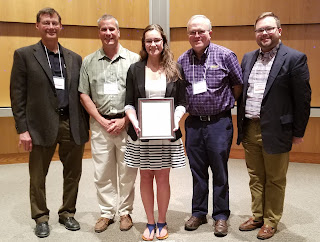 |
|
Corianna Borton ’19 (center) with adviser Dr. Brian Mohney
(center left) and co-adviser Dr. Jeff Weidenhamer (center right).
|
May
2019 AU graduate Corianna Borton was selected as the recipient of this year’s
Ernest B. Yeager award by the Cleveland Chapter of the Society for Applied
Spectroscopy (SAS) and the Analytical Topics Group of the American Chemical
Society (ACS). The Yeager Award honors
the memory of Ernest B. Yeager, the Frank Hovorka Professor Emeritus at Case
Western Reserve University who was known for his pioneering contributions to
the fundamental understanding of electrochemical reactions and to the
development of fuel cell and battery technology.
The
award was presented on May 22nd at the annual Conference on
Spectroscopy and Analytical Chemistry at John Carroll University, where Borton
gave a presentation of her research that has focused on collecting,
separating and analyzing plant root exudates (harmala alkaloids) from Syrian rue
in soil using silicone tube microextraction probes—a technique for repeated
sampling of lipophilic compounds in soil developed in Dr. Mohney’s and Dr.
Weidenhamer’s lab. Syrian Rue releases molecules into the
soil that affect the growth of other plants in the vicinity and negatively
impact organisms that live in the soil near the plant. Borton’s technique
utilized silicone probes to sequester and
concentrate lipophilic organic compounds allowing her to quantify the root and
soil alkaloids. Once sequestered,
compounds were extracted from the silicone and the concentration of each
compound was measured using ultraviolet spectroscopy (UV), fluorescence
spectroscopy and high performance liquid chromatography with UV and fluorescence
detection. She has used these techniques to probe the
dynamic release of harmala alkaloids from plants and to examine the effect the
alkaloids have on monocot and dicot plants. The Yeager award recognizes Borton’s
achievements in independent research, particularly in the application of
spectroscopy to the analysis of these root exudates. She received a certificate, a $400 monetary
award and a year's membership in SAS.
This is the third time an AU student or students have been selected to win this prestigious award. Corianna’s co-adviser, Dr. Jeff Weidenhamer, professor of chemistry, received the award as an AU undergraduate student in 1979, and Jennifer Miller Tully and Daphne Guinnwere selected as co-recipients in 2011 for their work on cadmium contamination of inexpensive jewelry.
Dr. Mohney notes, “The Yeager Award is quite an honor for both Corianna and for Ashland University. Corianna has been an exceptional member of Ashland University’s Honors program. She has excelled in using analytical and instrumental methods at solving research problems and has been able to perform high-level independent research at a graduate-student level since her junior year at Ashland.“ Corianna is pursuing a career in forensic science, and has been accepted into the Bowling Green State University Master’s Program in Forensic Chemistry.
This is the third time an AU student or students have been selected to win this prestigious award. Corianna’s co-adviser, Dr. Jeff Weidenhamer, professor of chemistry, received the award as an AU undergraduate student in 1979, and Jennifer Miller Tully and Daphne Guinnwere selected as co-recipients in 2011 for their work on cadmium contamination of inexpensive jewelry.
Dr. Mohney notes, “The Yeager Award is quite an honor for both Corianna and for Ashland University. Corianna has been an exceptional member of Ashland University’s Honors program. She has excelled in using analytical and instrumental methods at solving research problems and has been able to perform high-level independent research at a graduate-student level since her junior year at Ashland.“ Corianna is pursuing a career in forensic science, and has been accepted into the Bowling Green State University Master’s Program in Forensic Chemistry.


